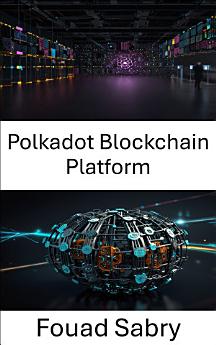Polkadot Blockchain Platform: Empowering Scalable Governance Through Next Generation Blockchain Networks
About this ebook
Chapters Brief Overview:
1: Polkadot (blockchain platform): Introduces Polkadot’s role in creating interoperable and scalable DAO networks.
2: Initial coin offering: Explores ICOs as foundational tools for DAO funding and community alignment.
3: Solana (blockchain platform): Highlights Solana’s speed and how it influences DAO responsiveness and usability.
4: Polygon (blockchain): Explains Polygon’s scaling solutions and their impact on DAO cost efficiency.
5: Ethereum: Outlines Ethereum's role as the pioneer in smart contracts and DAO creation.
6: Cardano (blockchain platform): Focuses on Cardano’s researchdriven DAO governance and consensus models.
7: Decentralized application: Examines dApps as DAO frontends, driving interaction and decentralized control.
8: Counterparty (platform): Covers Counterparty’s protocol for DAO asset creation on the Bitcoin network.
9: Astar Network: Highlights Astar’s support for multichain DAOs with crosschain capabilities.
10: Consensys: Showcases Consensys’ influence in DAO development and infrastructure tools.
11: Proof of stake: Details PoS mechanisms supporting DAO integrity, security, and sustainability.
12: Web3: Defines Web3’s framework for userowned networks and DAO integration.
13: Chainlink (blockchain oracle): Describes Chainlink’s oracles empowering DAOs with reliable offchain data.
14: TON (blockchain): Analyzes TON’s ecosystem and its alignment with scalable DAO infrastructures.
15: BTCS Inc.: Profiles BTCS Inc. as a public example of DAOaligned investment platforms.
16: Tokenomics: Demonstrates how DAO incentives and economics drive user behavior and trust.
17: Gavin Wood: Explores the vision of Gavin Wood in founding Polkadot and decentralization.
18: 0x (decentralized exchange infrastructure): Explains 0x's role in facilitating DAO asset exchange and governance liquidity.
19: The DAO: Reflects on the original DAO’s rise and fall, shaping future DAO architectures.
20: Blockchain: Introduces blockchain’s core principles enabling decentralized selfrule.
21: Decentralized autonomous organization: Summarizes DAOs as autonomous, programmable entities redefining governance.
For professionals, students, and curious minds alike, this book offers clarity on a complex yet transformative subject. It illuminates how political science evolves when governance becomes decentralized and digital. Dive into the frameworks that will define future institutions.











